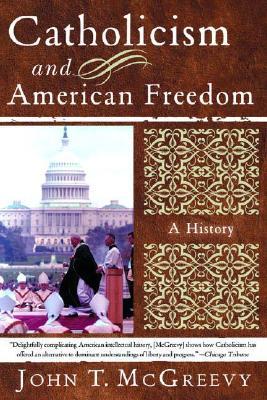There will always be tension between America’s experiment with democracy and hierarchically structured Roman Catholicism, because the two proclaim different concepts of freedom. While the former is grounded in the individualism of Protestantism and, more recently, of secularism, the latter regards true freedom as being circumscribed by claims imposed by considerations of the common good and by natural and supernatural law. In Catholicism and American Freedom: A History, John T. McGreevey, the John A. O’Brien Associate Professor of History at Notre Dame, sketches the main events, ideas, and characters that have shaped American Catholicism since the 1840’s. His thesis is grounded in the triangular tension among the local Catholic Church, wary authorities in Rome, and the civil and cultural ethos of the country. In this light, McGreevey discusses such key issues as schooling, slavery, social justice, sexual morality, and religious freedom. While his analysis of these matters will enrich the historian and theologian, it is the cultural anthropologist who will most benefit from the insight McGreevey brings to the inter-Church and civil dynamics that continue to produce uneasiness between Catholic liberals and conservatives and to cause strains in Church-State relations.
McGreevey is most insightful in his presentation of the philosophical and theological beliefs of certain priests, bishops, and lay theologians who have driven Catholic opinion and behavior. Two Jesuits in particular represent the contending schools of separatism and inculturation that, to this day, incite debate in Catholic circles. Fr. Bernadine Wiget greatly feared the Protestantizing effects the public schools in Boston might have on newly arrived Catholic immigrants, and his crusade for Catholic schools had a ghettoizing effect on Catholic life that gradually encompassed cradle-to-grave care designed to produce group cohesiveness and solidarity that would ensure strong loyalty to Rome. A second, more liberal, school working to promote a more mainstreamed Catholicism was advanced in the mid-20th-century writings of Fr. John Courtney Murray. His work on Church-State relations and religious freedom more or less paved the way for Cath-olics to participate in American social structures and political processes, for the advancement of the common good.
McGreevey’s discussion of various Cath-olic leaders’ positions on slavery during the Civil War era, the Church’s intrusion into the arena of social justice, and the loud voice it has raised on behalf of sexual morality and the sanctity of life demonstrate the Catholic Church’s role as a dynamic cultural force perennially to be reckoned with in America. The contributions of such Catholic activists and intellectual giants as Orestes Brownson; Archbishop John Hughes; Fr. John A. Ryan; John C. Ford, S.J.; and Gerald Kelley, S.J.; as well as the effects of the neo-Thomist school of Nouvelle Théologie in America (which included Jacques Maritain; Henri deLubac, S.J.; Yves Congar, O.P.; Karl Rahner, S.J.; Bernard Lonergan, S.J.; and, of course, Murray himself), provide the ideological framework that shaped the battles both within and against the American Catholic Church.
Rome’s uneasiness with American liberty, according to McGreevey, stems from the Vatican’s experience with European liberalism, which, for centuries, denigrated the Church’s authority and Her claims to absolute truth. The merest hint of such an attitude in the United States often entailed the appointment of heavy-handed, Rome-oriented (ultramontane) bishops, along with the call for a return to Thomistic philosophy and theology in the interest of bolstering the traditional Catholic worldview. The Vatican’s justifiable concerns—which stem both from America’s hostile pragmatism toward, and incompatibility with, Catholicism and from theological historicism’s emphasis on individual conscience as promoted by the Nouvelle Théologie—are nevertheless given short shrift by McGreevey. Certainly, the abandonment by many Catholics of Church teaching on life issues should have engendered some analysis of, and sympathy for, Roman vigilance. While the last chapter of the book attempts to discuss certain contemporary problems in the American Catholic Church, such as the refusal of many Catholic politicians to legislate in accord with Church teaching in moral matters and the clerical sex-abuse scandal, McGreevey falls short of offering any insight into them. Perhaps we do not yet stand at a great enough distance from these phenomena to study their causes or to determine their effects on Catholics in America. However, McGreevey fails to draw the connection between these problems and the regnant license that has gained hegemony in America and, in some cases, the Church. Despite this lack, his book is a superb study of American Catholicism. It will be a tremendous resource for the thoughtful reader.
[Catholicism and American Freedom: A History, by John T. McGreevey (New York: W.W. Norton & Co.) 295 pp., $26.95]



Leave a Reply